
Part 2 MARK STATMAN: MEXICO AND THE POETRY OF GRIEF AND CELEBRATION
Part 2 of my interview with Mark Statman looks closely at Mark’s Latin American poetic influences, his life in Mexico and ends with an extract
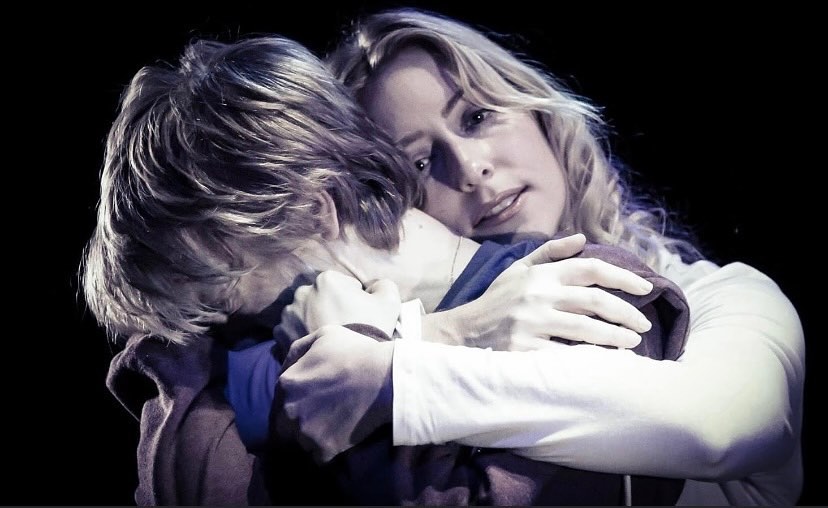
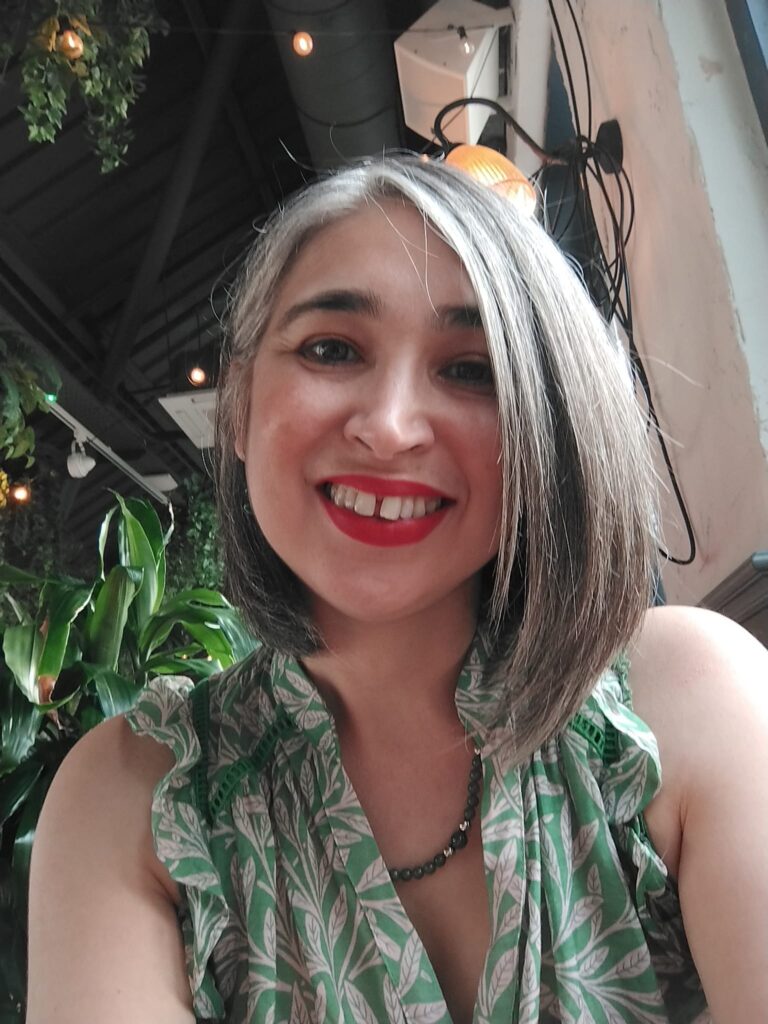
I interviewed poet Tracey Rhys, whose first collection told the inside story of raising an autistic son. Tracey won the Poetry Archive’s competition with the video of her poem Panopticon. She works in close collaboration with the Cardiff theatre company, Winterlight, devising poetry for use in theatre.
Leslie: Tell us about your first poetry collection, Teaching a Bird to Sing – what are the characteristics of your son that inspired it, and how do you use language to recreate your relationship with him?
Tracey: I was talking to an old friend recently: we see each other a few times a year but always alone, just us, so I was telling her how I wish I could encapsulate my boys for her, to tell her the stories that really sum them up. It’s amazing how hard it is to do that in a verbal sketch. Even the anecdotes don’t cut it. I mean, everyone adores their kids, and next to no one can encapsulate why. There are just a million little reasons, and not least because you know them inside out, understand them, empathise with them, and just love them: limp shouldered, helpless love.
If I go right back to when I began writing about Morgan, my eldest child, who is the bird in Teaching a Bird to Sing – he was a toddler, just three years old. That’s when children start full-time school here in Wales. Here was a child with developmental and communication difficulties – deep down, I knew this, but I didn’t truly understand it as he did have language. His vocabulary was even slightly advanced for his age, but he used it sparingly, unusually, as if it was a hindrance to him. At one point, I debated teaching him sign language; it seemed so natural and speech frustrated him so. His replies to my questions were delayed: I would learn later that he has an auditory processing delay, which means that he takes a few moments to process anything that’s said to him. He would reply clearly and enunciate carefully, but even so, there were never the endless questions or the babble of other small children. My husband and I did all the talking and when we stopped, the house fell silent.
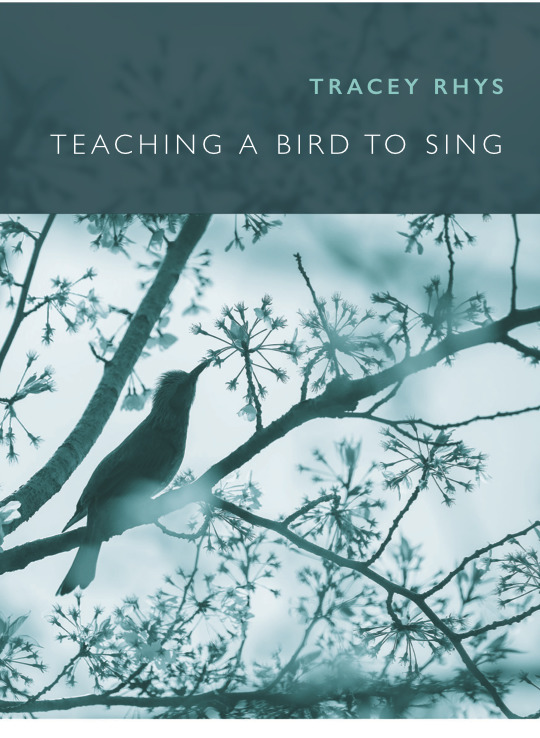
When he began the difficult and lengthy process of diagnosis, he was four or five years old. This is when I began to write about him in earnest. I think I was trying to fill the gaps in people’s perceptions of him – the teachers who wanted him to conform for the classroom setting, the doctors for whom he was just another patient who met a diagnostic criteria, the distant family members who would never know him but who might have a misconception of autism. I wanted to show them all. To say: look at this boy – his wit, his empathy (that lack-of-empathy line about autism is a complete nonsense, by the way). This lovely child. And I did that by writing in the only way I knew how – from my perspective, telling my stories, which were his stories too – until he was old enough to tell his own.
In the poem Echolalia, I experimented with adopting his speech patterns into the poetry, specifically how he would mimic inanimate noises and use them as language. I’m a great believer in communication and aggression being directly linked, so I wanted to crack the world of words wide open for him: to teach him to name his emotions as well as to translate all the wonderful things around him into nouns and descriptors: to show him that the words he so loved to look at on the page translate to the swell of feelings in our heads and our hearts.
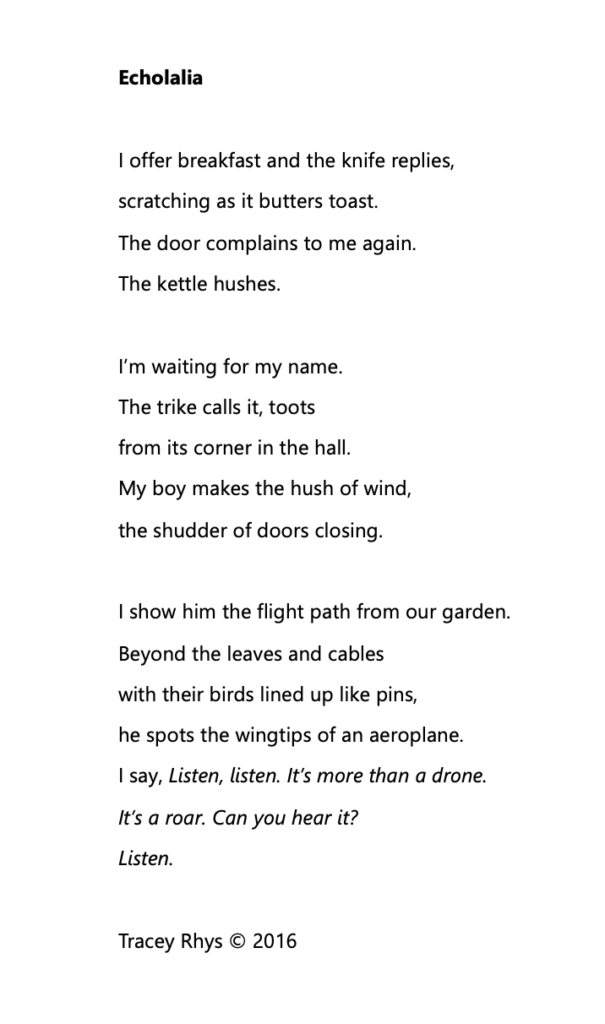
At the back of my mind, while I was writing poems like this one, was the hope that one day he might read it and think yes – I hear it. I get it now, Mum. That was a huge driving force when writing those poems.
Leslie: You must have had a desire to show people that autism is often misunderstood. But poetry isn’t generally a lecture or clinical report or cautionary tale. How did you decide to approach the subject? How did you avoid ‘telling the reader’ while making sure they fully understood your son’s individuality?
Tracey: I honestly had no sense of any intention when I wrote this collection. I simply didn’t know enough about autism to have attempted to write about it at the time. What has happened is that by writing about my life with my child, I’ve written a little something about autism. Indeed, there’s a very prescient saying amongst the autism community which goes: if you’ve met one person with autism, you’ve met one person with autism! It’s such a broad spectrum. I wanted only to write our story as it appeared to me in that moment in time, moving from his baby days, when I was parenting in a bubble, as all small children develop at such different paces, to the early school years. Some of the poems in the collection show our insularity, such as Shelling Peas, while others reveal how unusual our ‘normality’ appeared to the outside world (for instance, The Boy Who Cannot Lie). But more than anything, I wanted to show the beauty of him, of this life the three of us had built together.
As time progressed, so too did the process of his diagnosis, and so what I ended up with was a collection that documented a journey. As for writing about autism, I suspect that by the end of the collection, you will know a lot more about me as a mother than about autism as a condition. There are some wonderful neurodiverse poets out there such as the wonderful Jane Burn, who writes so powerfully and uniquely about her experiences. Her work never fails to move and excite me, moving as it does into unexpected directions and examining what it is to be human at this moment in time, on this planet we call Earth. I must add, too, that these days, my son Morgan is an eighteen-year-old poet who writes beautifully about his neurodiverse experiences. Let’s see more writing initiatives out there to encourage people like him, and others. There are so many important voices yet to be heard.
Leslie: Why did Panopticon win the Poetry Archive’s competition? What makes it a prize-winning poem?
Tracey: Hmm, that’s a really difficult one! I’m sure it helped that it was a video-poem so I was able to film myself until I got it right! The competition took place during lockdown, when we were all getting to grips with Teams and online meetings. There was something about that time – how our window to the rest of the world was via a screen in our homes – how we were all experiencing these great seismic shifts together, yet apart. The poem was a satirical response to our appreciation of the natural world during covid, when our lives slowed to match the pace of the seasons.
I wanted to write about the fickle swing, as we moved away from being consumers to becoming natural observers. And I wondered what we might learn from the experience, if only we could keep slowing, keep looking. I definitely entered a different sort of poem for that competition to my usual type of submission, as the poem had to appeal to the ear as well as the page. There was humour involved, and I enjoyed playing with that as I love to write humorous prose in my short stories, but I rarely bring that into my page poetry. All that aside, I genuinely think that what makes a prize-winning poem is ultimately in the lap of the gods – as in the judges’ taste on one day, at one time in their lives. Which is disconcerting in that there is no real recipe for success but hopeful too: we should keep trying!
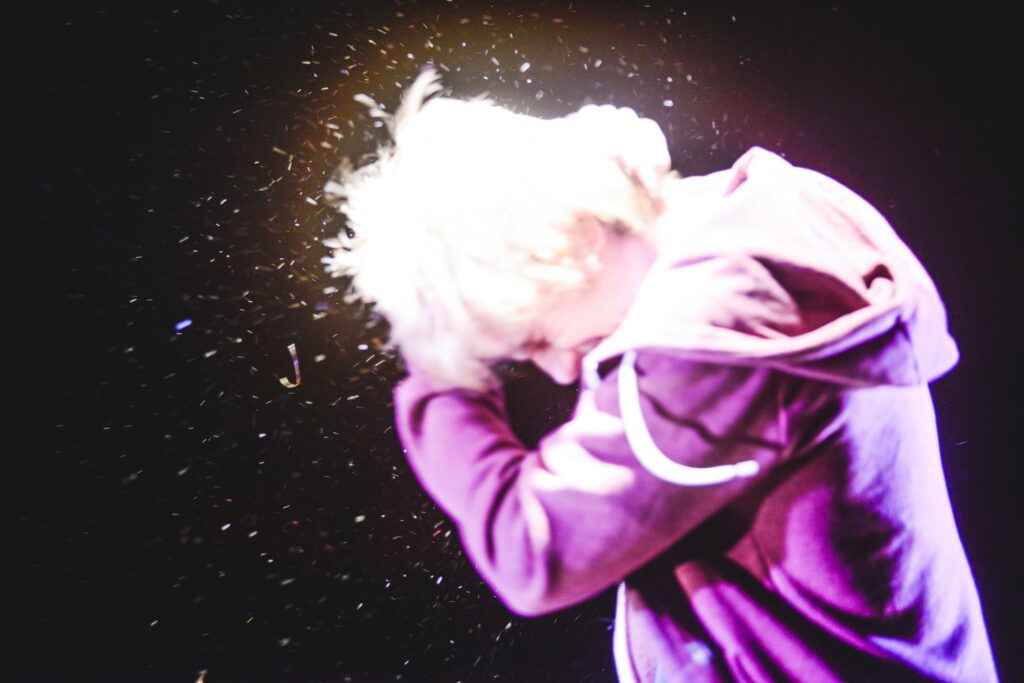
Leslie: How do you work collaboratively with Cardiff theatre company, Winterlight? What’s the give-and-take involved?
Tracey: Every now and then, I get to call myself a Poet in Theatre. As you might guess, that’s not an official job title (oh, I wish!) but a name which best describes my involvement with the work of stage director Chris Durnall and writer Tim Rhys. I’ve been brought in to work on two of their projects so far, Touch Blue Touch Yellow and Quiet Hands, with a further play currently in the early stages of development. In both cases, the chief protagonists were young adults experiencing the world and all its dangers and difficulties through the lens of autism. In Touch Blue Touch Yellow, my job was to reveal the internal thoughts of the mother character through the development of poetry as monologue. The script had already been written and so once I’d read and discussed the plot with Tim, I was able to both adapt poetry that had already been written about my relationship with Morgan, and also to begin writing new poetry specifically for the character.
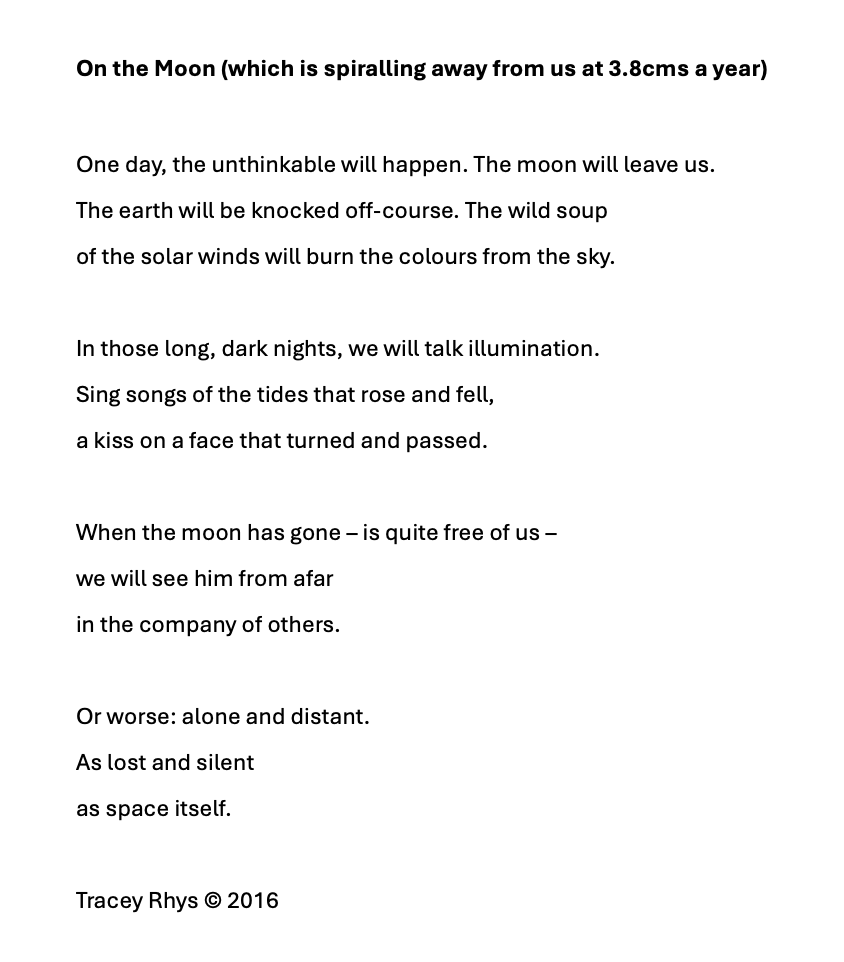
On The Moon is the opening poem in Teaching a Bird to Sing, but it was actually written specifically for the play. My motivation was really just an extension of my fears for Morgan’s future, as at that time the many social and sensory challenges of the school environment had rendered him hugely withdrawn at home, so much so that I really feared for him. I worried that he would find the world more and more inexplicable as he grew, sinking into a kind of catatonia where he was lost to us.
Here I am a decade later, my son now a young adult and coping well I should add – happy and well-supported by his school and college – but I can tell you that On the Moon is a poem that grows closer and closer to my heart. It seems to be one of my more popular pieces about parenting, as readers recognise the anticipation and inevitability of the empty nest, which comes with great pride, and at a huge price.
Poetry integrated into theatre is really a wonderful thing. I don’t know why we don’t use poets much more routinely in that context. Shakespeare certainly knew what he was doing when he wrote his plays in metre and rhyme! I’ll never forget seeing that first production of Touch Blue – I had sat in on some script-in-hand rehearsals, decoding the poetry, unpacking the lines, so that the intention could best be drawn out. The rest of the time I left my poems in the expert hands of Chris Durnall and Tim Rhys, who figured out the best ways to embed them into the narrative. Discovering how they had become interwoven was a revelation: it wasn’t obvious that poems were being spoken at all. My writing had taken on a new life and belonged to the character now, and I loved that. The physicality that Chris’ direction had brought – the sparse set, the lighting, the intense interaction between the characters as the mother held her adult son in her arms and spoke her inner thoughts, made us voyeurs. It was a hairs-on-the-back-of-the-neck moment.
So, having worked as a poet in theatre, one thing I have learnt is that our own emotional responses are always the deepest and best wells to plumb as writers. Nothing else compares to that for authenticity, on the page or the stage.
If you enjoyed this interview, here are two links to some of Tracy’s most recent work: https://www.iambapoet.com/wave/17-tracey-rhys https://poetrywales.co.uk/tracey-rhys-how-i-wrote-he-tells-me-how-trees-communicate/
Next week I interview stand-up comedian Daphna Baram about her shows, including ‘Laughing For Palestine’
ABOUT LESLIE TATE’S BOOKS:

Part 2 of my interview with Mark Statman looks closely at Mark’s Latin American poetic influences, his life in Mexico and ends with an extract

I interviewed international poet and translator Mark Statman about Volverse/Volver, his 14th published collection. Mark, who has won national arts awards, is Emeritus Professor of Literary

I interviewed Lisa Dart, finalist in the Grolier, Aesthetica and Troubadour Poetry Prizes and author of The Linguistics of Light (poems, Salt, 2008), Fathom (prose

I interviewed writer Julia Lee Barclay-Morton about her experience of autism. Julia began as an experimental dramatist in New York, moving to the UK to

I interviewed Gillean McDougall from Glasgow, who edited the collaborative projects Honest Error (on Charles Rennie Mackintosh and his wife Margaret Macdonald) and Writing the
| Cookie | Duration | Description |
|---|---|---|
| cookielawinfo-checkbox-analytics | 11 months | This cookie is set by GDPR Cookie Consent plugin. The cookie is used to store the user consent for the cookies in the category "Analytics". |
| cookielawinfo-checkbox-functional | 11 months | The cookie is set by GDPR cookie consent to record the user consent for the cookies in the category "Functional". |
| cookielawinfo-checkbox-necessary | 11 months | This cookie is set by GDPR Cookie Consent plugin. The cookies is used to store the user consent for the cookies in the category "Necessary". |
| cookielawinfo-checkbox-others | 11 months | This cookie is set by GDPR Cookie Consent plugin. The cookie is used to store the user consent for the cookies in the category "Other. |
| cookielawinfo-checkbox-performance | 11 months | This cookie is set by GDPR Cookie Consent plugin. The cookie is used to store the user consent for the cookies in the category "Performance". |
| viewed_cookie_policy | 11 months | The cookie is set by the GDPR Cookie Consent plugin and is used to store whether or not user has consented to the use of cookies. It does not store any personal data. |